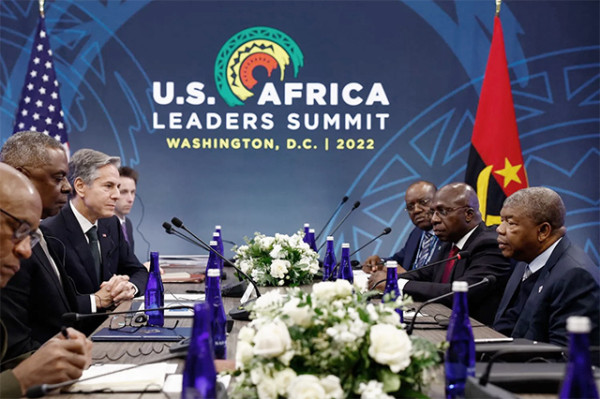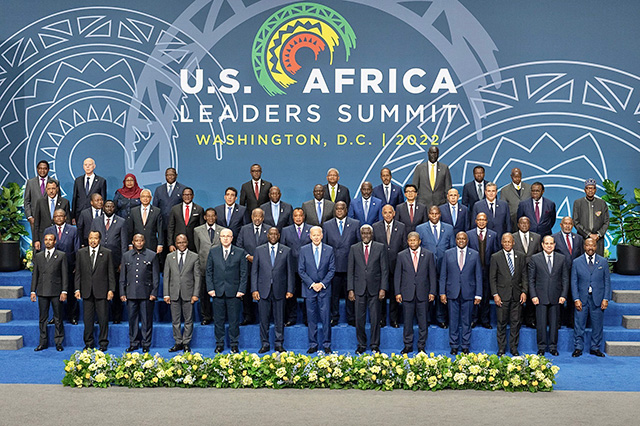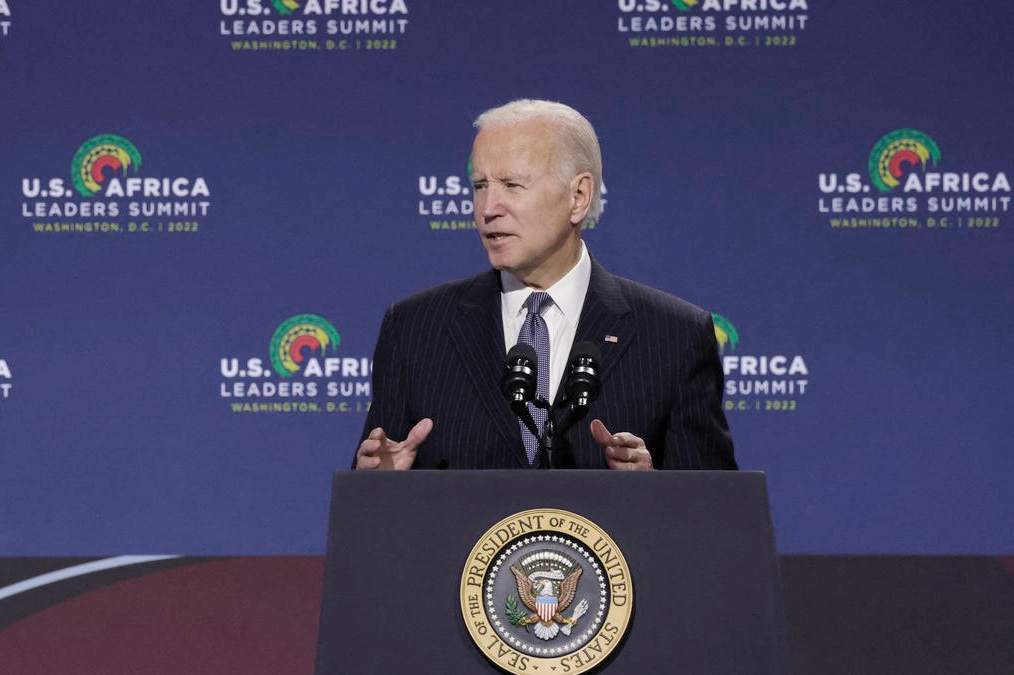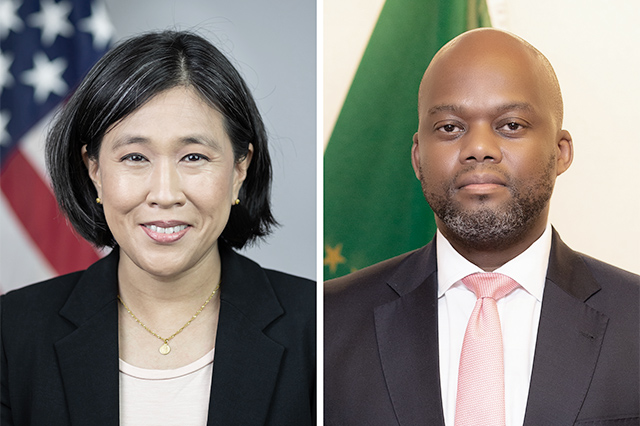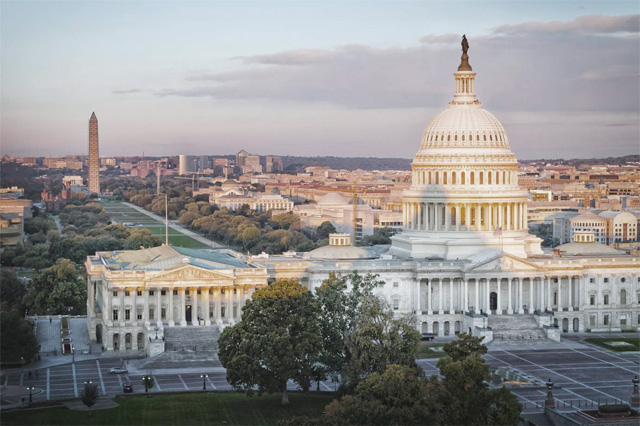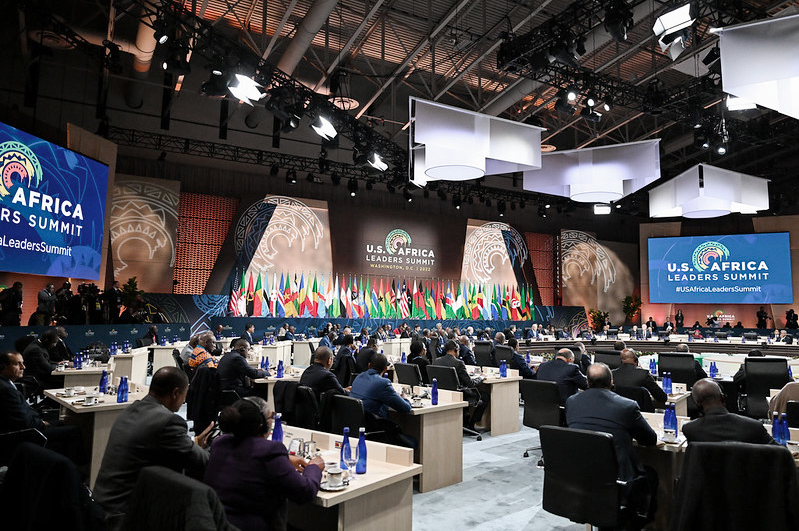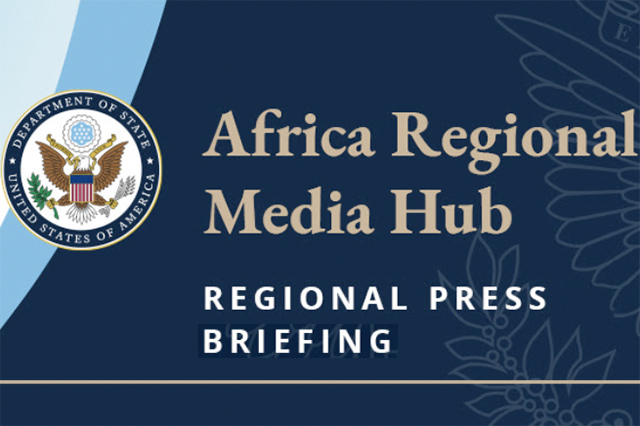The US-Africa Leaders Summit marks a seismic shift in relations with the continent
The second edition of the U.S.-Africa Leaders Summit (ALS) took place in Washington last week. Much has changed since former president Barack Obama held the inaugural summit in 2014, halfway through his second term.
At that time, the geopolitical environment for strengthening ties was less fraught: global economic integration was accelerating, and Africa was “rising” from sluggish growth and persistent poverty.
The initial summit was framed as an important first step in engaging with a “a new, more prosperous Africa,” as Obama put it.
But this year’s summit occurred against a worrying economic and political backdrop of global inflation, an impending debt crisis for several African countries, intensifying strategic competition between the United States and China, and a hot war in Ukraine.
In an uncertain international landscape, great and middle powers see a vital national interest in revamping relations with a continent that is perhaps the last frontier of future economic growth and an outsize voting bloc in multilateral fora.
Many of the analyses of the just-concluded ALS hosted by U.S. President Joe Biden compare it with high-level Africa summits convened by other great and middle powers.
After all, the Africa + U.S. summit is one of eleven different recurring “Africa +1” summits, and Africa+1 summitry has occurred with increasing frequency over the last decade.
Such comparisons often focus on regularity (the 2022 iteration was only the second ALS, versus eight Forums on China-Africa Cooperation [FOCAC] and eight Tokyo International Conferences on African Development [TICAD] as of this year); the headline financial commitment ($55 billion pledged by the United States at the 2022 ALS compared to China’s $40 billion pledge at the 2021 FOCAC and Japan’s $30 billion at the 2022 TICAD); the number of heads of states in attendance (forty-six including the chairperson of the African Union Commission at the 2022 ALS compared to fifty-one at the 2018 FOCAC); and whether bilateral meetings were set up between individual visiting African leaders and the host president (none at the ALS, while bilateral meetings with the Chinese president are a staple of FOCAC).
A “like-for-like” comparison is a worthy endeavor, but it is a narrow framework for evaluating the summit’s role in shaping the U.S. approach to Africa. A more useful assessment should take into account the evolution of American relations with the continent over the past few decades as well as more recent engagements with other low- and middle-income regions of the world, such as the U.S.-ASEAN Special Summit in May 2022 with Association of Southeast Asian Nations (ASEAN) countries and the Summit of the Americas in June 2022 with Latin American countries.
Evaluating the ALS in this light, the Biden administration’s approach to the summit ushered in a potentially seismic shift in the U.S. relationship with African countries. Five key policy approaches enabled this success.
Mobilizing a “Whole-of-Government” Approach
The Biden administration mobilized the full scope of the U.S. federal government to conduct the U.S.-Africa Leaders Summit. The White House anchored the ALS: President Biden and Vice President Kamala Harris gave several keynote speeches and hosted roundtables, bilateral meetings, lunches, and dinners with the forty-nine visiting African delegations.
Still, the leadership of various U.S. government entities was also represented at the highest levels. There were cabinet secretaries from the Departments of State, Defense, Energy, Health, Agriculture, Labor, and Commerce; the heads of top federal agencies including the U.S. Export-Import Bank, the U.S. International Development Finance Corporation, the Millennium Challenge Corporation, the U.S. African Development Foundation, the U.S. Agency for International Development, the U.S. Trade Representative, and the U.S. Trade and Development Agency; and members of the U.S. Congress including outgoing House Speaker Nancy Pelosi. Neither the leaders from Latin America nor those from Southeast Asia—hosted at their respective leaders’ summits in the United States this year—received such a grand reception as did African leaders from December 13 to 15.
Furthermore, throughout the summit’s dialogue sessions, senior U.S. government officials displayed remarkable openness to listening to and collaborating with their African counterparts. This receptiveness helped temper the long-held frustrations of many African stakeholders at what they perceive as persistent badgering by U.S. government officials about African institutional inadequacies and the tendency to delegate lower-ranking American officials to engage with senior African policymakers.
Supporting Africa’s Representation in Global Governance
One of the major highlights of the ALS was Biden’s formal announcement of U.S. support for the African Union’s bid to join the G20 as a permanent member and his reiteration of U.S. support for UN Security Council reform to add a permanent member from the African continent. While this announcement comes weeks after Beijing and Paris expressed their support for African Union (AU) membership in the G20, it nevertheless carries a heavy weight because other major European countries will likely follow Washington’s lead on reforming global governance institutions. The promise to expand decision-making in international institutions to include Africa was particularly notable because neither ASEAN nor the Organization of American States (OAS) received an analogous pledge from the United States during their respective leaders’ summits.
Pledging Billions to Advance Shared Priorities
Perhaps the most talked about outcome of the ALS is the United States’ commitment of $55 billion to the African continent over the next three years. These funds will support the AU’s Agenda 2063 by investing in human capital, infrastructure, agriculture, health systems, and security in ways that advance shared U.S. and African priorities. It may be tempting to contrast this funding amount with the $40 billion announced at the 2021 FOCAC, but a better analogy is to previous U.S. initiatives toward Africa.
This $55 billion includes over “$15 billion in [new] two-way trade and investment commitments, deals, and partnerships” announced during the summit to be anchored by more than a dozen U.S. federal departments and agencies (see Table below). Much of this headline pledge will comprise existing initiatives, and several will depend on the ability to secure actual funding from the U.S. Congress within the next twenty-four months. This financial pledge is different from the flagship initiatives announced previously: Obama’s Power Africa; George W. Bush’s President’s Emergency Plan for AIDS Relief (PEPFAR); and Donald Trump’s Prosper Africa. Similarly, the $55 billion dwarfs the new financial pledges announced at the U.S.-ASEAN Special Summit ($150 million) and the Summit for the Americas.
Moving From Aid to Trade and Investments
A crucial but underappreciated thread running through the dozens of new initiatives announced at the ALS is their predominant focus on facilitating trade and investments in human and physical capital. In our assessment of the thirty-three new initiatives to be implemented with public funding, eighteen are in economic sectors that will facilitate trade, investments, entrepreneurship, and jobs creation (see Table above). Separately, $15.7 billion worth of private sector investments and partnerships were showcased in a deal room coordinated by the Prosper Africa initiative.
This unprecedented shift “from aid to trade” was reiterated by Commerce Secretary Gina Raimondo on the second day of the summit. She explained that the U.S. government wants to “move from just aid – yes, we need aid – but move beyond just aid to investment . . . and partnership to unlock the potential of the private sector to the benefit of [all] of our countries.” This move is likely in part a response to decades of advocacy by scholars and policymakers. And it is warranted, because a persistent humanitarian approach to Africa to the exclusion of all else creates pathologies of unhelpful dependency among recipients of handouts, insufficient focus on the drivers of inclusive growth that will raise incomes and meaningfully pull people out of poverty, and perverse incentives for the continuation of the status quo by a small coterie of connected beneficiaries.
Supporting Key Pan-African Initiatives
Throughout the summit, the U.S. government gave deference to the continent’s pan-African flagship initiatives. The fifty countries invited to the summit were those in good standing with the AU. The $55 billion pledge is broadly aimed at supporting the AU’s Agenda 2063, the continent’s blueprint for its economic and social transformation. A new Digital Transformation with Africa (DTA) initiative will invest over $350 million and facilitate over $450 million in financing for Africa, in line with the AU’s Digital Transformation Strategy. The Export-Import Bank of the United States signed three memoranda of understanding worth $1.3 billion with Afreximbank, the Africa Finance Corporation, and the Africa50 infrastructure fund to support the expansion of U.S.-Africa trade. These U.S. government efforts in partnership with pan-African institutions, such as the signing of a memorandum to support the Africa Continental Free Trade Agreement (AfCFTA) implementation, help dispel erstwhile suspicions that the pursuit of a bilateral U.S.-Kenya Free Trade Agreement will deliberately undermine the AfCFTA.
A qualified success
The outcomes of the ALS demonstrate a decisive paradigm shift in how the United States views Africa—as a continent central to the future of the global economy and the international order. To that end, the summit advanced the realization of the twenty-first-century U.S.-Africa partnership promised in the strategy document published in August 2022. Although this evolution in the U.S. approach to Africa is happening against the backdrop of intensifying great power competition with rivals like China, Washington appears to be finally reframing its relationship with the continent in largely positive terms by bringing to the table America’s core strengths in private capital, advanced technologies, and soft power including the large African diaspora.
Still, so much of the trust that is slowly being rebuilt between African countries and the United States hinges on the financing and implementation of the dozens of initiatives announced at the summit. To that end, the performance of seasoned Ambassador Johnnie Carson, who has just been appointed to coordinate execution efforts as the Special Presidential Representative for U.S.-Africa Leaders Summit Implementation, will make or break this progress. Whether the Biden administration can secure authorization from Congress to provide much of the $55 billion pledged is another decisive factor. Ultimately, the responsibility for the sustained economic and social transformation of the African continent espoused in Agenda 2063 lies with African countries themselves.


